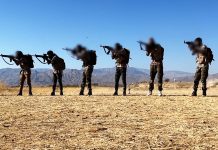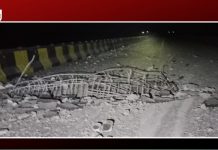The senior spokesperson for the National Party, Senator Hasil Khan Bizenjo said in a statement that Pakistan has become the most dangerous country in the world for journalists.
Bizenjo said that the Pakistani government has failed to ensure the safety of the journalists and resultantly, Pakistan has become the most dangerous country on the planet for journalists. He said that the powerful state institutions, criminal-minded elements and influential politicians are behind the attacks on media persons. These times are the hardest times for the media, he said.
Bizenjo also lamented that the media persons who “exposed the government’s corruptions” to the public await the arrest and persecution of their killers.
Bizenjo appealed to the government to immediately arrest the murderers of the journalist Anwar Jan Khetran who was killed in Barkhan on 23 July. He pledged that the issue of the murder of Khetran and grievances of the other journalist community will be raised on ‘all the forums.’
Reporters Without Borders, in its 2020 Press Freedom Index, ranked Pakistan 145 out of 180 countries. The Paris-based organization alleges that the Pakistani state and its mighty military establishment “cannot stand independent journalism.” The organization says that the authorities have constantly attempted to squelch freedom of information with “brazen censorship” – like interrupting the distribution of newspapers and threatening media outlets of advertisement withdrawal. RSF further says that the establishment has reined in the state media and has set about to purge the social media of “content not to its liking.”
Earlier in June, the RSF warned the Pakistani government to not threaten journalists living abroad adducing a leaked ‘interior ministry memo’ that accused five journalists – four Pakistani and one Afghan – of “damaging Pakistan’s foreign interests abroad.” The organization said that if any tragedy befalls the journalists in question, Pakistan will be responsible.
In the current Balochistan insurgency, 30+ journalists have been killed on the Baloch soil for allegedly reporting the insurrection in Balochistan. During a visit to Khuzdar in 2013, Hamid Mir, a prominent, outspoken Pakistani journalist, was forced by the local militia called ‘Death squads’ to give coverage to the widows of Pakistani soldiers that had died fighting the Baloch insurgents. According to the Mir, the forced interview took place close to a security check post. Mir was once again threatened in 2014 not to invite Mama Qadeer and Farzana Majeed, the Baloch activists who were raising voice against enforced disappearances in Balochistan, in his show – Capital Talk. When he did not comply, Mir was shot in Karachi, but he survived. Days before the incident, Mir had confessed to his brother, Amir Mir, and his affiliated news channel, Geo news, that if anything happens to him, the then ISI Chief Zaheer-ul-Aslam be held responsible.
In May, the exiled Baloch journalist Sajid Hussain was abducted in Sweden; his body was found in a river in Uppsala two months later. Malik Siraj Akbar, another Baloch journalist, was forced to flee Pakistan and seek asylum in the United States. Hayatullah Khan, a freelance journalist, and Saleem Shehzad, Pakistan’s Asia Times correspondent, were killed in 2006 and 2011 respectively, allegedly by the Pakistani security forces. Matiullah Jan, Waqt News journalist known for his criticism of Pakistani military, was abducted on the previous Tuesday and released 12 hours later. Many other journalists have been abducted and killed in Pakistan allegedly for their critical stance on Pakistan’s military establishment and reporting on the human rights abuses throughout the country.






























